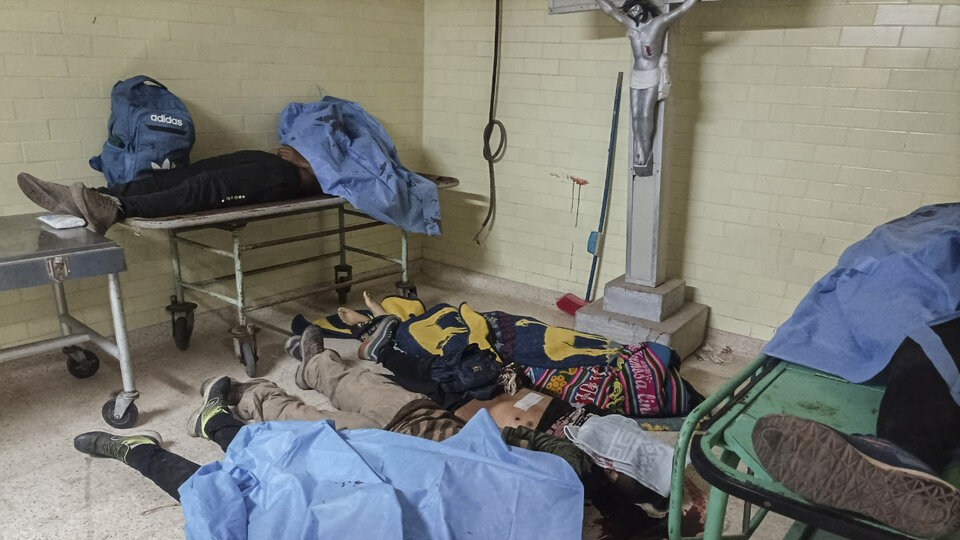Page/12 in Peru
From Lima
This Monday was a new tragic day in the popular mobilizations against the government of President Dina Boluarte and the Congress that controls the right. The repression of the protests has left at least twelve dead by police shots in the highlands region of Puno. Since the protests resumed on January 4, Puno has been the epicenter of the largest mobilizations, but not the only place where they have been taking place. At the close of this note, the confrontations and massive mobilizations continued there.
A large number of protesters surrounded the airport, closed for days. These are the first deaths since the restart of the protests in January. In December there were 28 deaths, 22 of them shot by the army and the police. And there were 485 injured, according to a report from the Ombudsman’s Office.
There are mobilizations in several cities and this Monday the airport in the Andean region of Ayacucho was closed due to the protests. Various blockades are maintained at more than fifty points on roads throughout the country. A newborn died when the ambulance in which he was being transferred could not pass a blockade. In recent days, more than 300 arbitrary detentions have been denounced in Lima.
In this context of intensifying mobilizations, this Monday the government decided to prohibit former Bolivian President Evo Morales from entering the country, accusing him of promoting protests in Puno, the border area with Bolivia. They also point it out, without serious arguments, of supporting supposed separatist intentions of the southern Andean populations. Morales was described as “a threat to internal order and national security.” This prohibition extends to eight other Bolivian citizens.
The government has justified this unusual prohibition against Morales in the Migration Law, which states that it can be taken against those who “threaten or disrupt internal order.” He is accused of interfering in the protests for having commented that they are an “insurgency” against “the colonial State”, and for asking that “the repression cease”. Morales’s accusers point out that the Runasur project launched by the former Bolivian president to promote the articulation of the native populations and popular organizations, seeks to promote the separation of the indigenous populations of the southern Andes of Peru.
The ban on Evo Morales from entering Peru, absurd in its justifications and an expression of authoritarianism that has gained space, occurs in the midst of a campaign with broad media support to criminalize protests, which accuses protesters of “terrorists” and tries to explain the popular indignation by blaming supposed “tigers” from the local and international left. These accusations elude the fact that there is a discredited political class, poverty, marginalization and racism suffered by the mobilized populations, and repression by a government allied with the right, leaving more than thirty dead.
“He will not enter Peru again,” said the head of the ministerial cabinet Alberto Otárola, referring to Evo Morales. In a threatening tone, he assured that the government “is carefully observing, not only the attitude of Evo Morales, but also those who work with him in southern Peru.” Before the decision to ban him from entering the country was known, Evo had responded by saying: “We turn the other cheek to the political attacks of the Peruvian right. But, please, stop the massacres, illegal detentions, persecution and “terruqueo” (term used in Peru when someone is falsely accused of being a terrorist) against our indigenous brothers”. The deep Peru demands a fundamental transformation.
In a statement, the Movement for Socialism (MAS) described the accusations against Morales as “an attack promoted by an illegitimate power group stained with the blood of our indigenous brothers murdered for demanding democracy and social justice.” And they reject the criminalization of the Runasur project.
From the Peruvian left they condemned this ban on entry to the country: “This decision against Evo Morales is unacceptable, it is a way of avoiding the responsibility of the government of Dina Boluarte for the crisis, it is not understanding that the crisis is in our country. Instead of looking for a scapegoat abroad, the government must take responsibility for the crisis, find a way out and guarantee that there will be no more deaths and injuries,” said legislator Ruth Luque.
From the other side, the parliamentary and media right wing enthusiastically celebrated the ban on Evo’s entry into the country, a decision made one day before the ministerial cabinet attends the right-wing majority Congress to request a vote of confidence, a requirement to be ratified. This is a new gesture by the government in its approach to the right and extreme right, reinforcing the coincidences of the Executive with these benches on the eve of the presentation of the cabinet in Congress. The support of the right would assure the cabinet a vote of confidence.
“They are subversive, criminal, undesirable people,” attacked Fujimori legislator Ernesto Bustamante, referring to a transfer from Congress to Evo Morales. The president of Congress, retired general José Williams, accused of human rights violations, joined the attacks against Morales. Lawmaker from the far-right Renovación Popular party, retired Admiral Jorge Montoya, filed a criminal charge against Morales for promoting the protests and requested his extradition.
While the popular protests do not stop and the repression and deaths continue, the government and the parliamentary and media right-wing divert the spotlight, directing it against Evo Morales.
